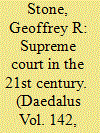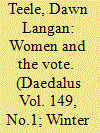|
|
|
Sort Order |
|
|
|
Items / Page
|
|
|
|
|
|
|
| Srl | Item |
| 1 |
ID:
165138


|
|
|
|
|
| Summary/Abstract |
This paper examines the location and production of liminality with regard to voting rights of Tibetan exile community in India. Liminality is related here to the legal and bureaucratic ‘inbetweenness’ that characterises and orders the life of the Tibetan exiles in India. Tibetans born in India have been registered as voters in India’s electoral list albeit without an accompanying claim or path to citizenship. The paper argues that these voting rights are simultaneously contested and embraced by the Tibetan exile community. Responses of the exile community to voting rights are produced by the interaction between (a) the lived experience of statelessness and (b) complex constructions of cultural, political and legal identity. Both these factors are fundamentally informed by the liminal space that the exile community inhabits in India.
|
|
|
|
|
|
|
|
|
|
|
|
|
|
|
|
| 2 |
ID:
133019


|
|
|
|
|
| Publication |
2014.
|
| Summary/Abstract |
The 1982 amendments to the Voting Rights Act targeted electoral structures as significant determinants of minority representation. The research regarding electoral structures and representation of constituents, however, has produced conflicting results, and the continued application of some of the provisions set forth in the Voting Rights Act is in doubt. This article addresses the impact of at-large elections on African American representation and reveals a striking and unanticipated finding: African Americans are now overrepresented on school boards that have at-large elections when African Americans are a minority of the population. Using the 1,800 largest school districts in the United States (based on original surveys conducted in 2001, 2004, and 2008), we find that partisanship changes the relationship between electoral structures and race to benefit African American representation.
|
|
|
|
|
|
|
|
|
|
|
|
|
|
|
|
| 3 |
ID:
142277


|
|
|
|
|
| Summary/Abstract |
This article uses the lenses of citizenship to examine the uneven distribution of voting rights in Bosnia and Herzegovina (BiH). While recognizing the significance of power-sharing in BiH, the article argues that the key obstacle to modifying the politics of inclusion and exclusion through citizenship and the franchise is the static nature of political competition in the country. The intimate relationship between political parties and their ethno-centric agendas on the one hand, and the multi-tiered governance structure on the other, prevents the possibility of reaching an agreement on constitutional reform as it would disrupt the current power balances that favour ethnic elites.
|
|
|
|
|
|
|
|
|
|
|
|
|
|
|
|
| 4 |
ID:
121045


|
|
|
|
|
| Publication |
2013.
|
| Summary/Abstract |
How does the Supreme Court serve the "common good"? What is the Court's responsibility, as the ultimate interpreter of the Constitution, in our constitutional system of government? This essay explores that question with an eye on the recent performance of the Court in highly controversial and divisive cases. What explains the Court's decisions in cases involving such issues as campaign finance regulation, gun control, abortion, affirmative action, health care reform, voting rights, and even the 2000 presidential election? This essay argues that there is a right and a wrong way for the Supreme Court to interpret and apply the Constitution; and whereas the Warren Court properly understood its responsibilities, the Court in more recent decades has adopted a less legitimate and more troubling mode of constitutional interpretation.
|
|
|
|
|
|
|
|
|
|
|
|
|
|
|
|
| 5 |
ID:
189051


|
|
|
|
|
| Summary/Abstract |
Native allies are critical to the success of immigrants’ social movements in East Asian countries because of their relatively small number. However, it remains unclear whether advocacy messages from natives or from immigrants are more effective in changing natives’ attitudes toward supporting immigrant-oriented policies. We hypothesize, from the perspective of social identity theory, that the persuasiveness of a message varies, depending on the identity of the group sending the message—that is, whether it is an in-group or an out-group. To test this hypothesis, we conducted a survey experiment using the case of granting local voting rights to immigrants in Japan. We found that support for granting local voting rights to immigrants does not decrease when the Japanese hear advocacy messages from the Japanese, however, it does decrease when they hear messages from Korean immigrants who stand to benefit from the granting of local suffrage. These results suggest that natives’ advocacy messages may increase support for immigrants.
|
|
|
|
|
|
|
|
|
|
|
|
|
|
|
|
| 6 |
ID:
171108


|
|
|
|
|
| Summary/Abstract |
There are four contexts in which women have won voting rights: as part of a universal reform for all citizens (15 percent of countries that granted women suffrage); imposed by a conqueror or colonial metropole (28 percent); gradually, after some men had been enfranchised (44 percent); or a hybrid category, often in the wake of re-democratization (14 percent). This essay outlines the global patterns of these reforms and argues that in a plurality of cases, where women's suffrage was gradual, enfranchisement depended on an electoral logic. Politicians subject to competition who believed women would, on average, support their party, supported reform. The suffrage movement provided information, and a potential mobilization apparatus, for politicians to draw on after the vote was extended. Together, both activism and electoral incentives were imperative for reform, providing important lessons for feminist mobilization today.
|
|
|
|
|
|
|
|
|
|
|
|
|
|
|
|
|
|
|
|
|